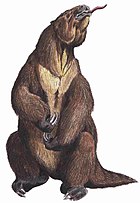Proschismotherium
| Proschismotherium Temporal range: Early Miocene, Santacrucian | |
|---|---|

| |
| Holotype jaw | |
| Scientific classification | |
| Domain: | Eukaryota |
| Kingdom: | Animalia |
| Phylum: | Chordata |
| Class: | Mammalia |
| Order: | Pilosa |
| Family: | †Megalonychidae |
| Genus: | †Proschismotherium Ameghino, 1902 |
| Species: | †P. oppositum |
| Binomial name | |
| †Proschismotherium oppositum Ameghino, 1902 | |
Proschismotherium is an extinct genus of ground sloth of the family Megalonychidae, endemic to Argentina during the Early Miocene. It lived from 17.5 mya — 16.3 mya, existing (as a genus) for approximately 1.2 million years.[1] The type, and only, species, P. oppositum, was named in 1902 by Florentino Ameghino based on a single specimen found in the Santacrucian-aged Colpodon Beds of Argentina.[2] Ameghino in 1902 placed Proschismotherium in the Megatheriidae,[2] alongside Hapaloides, which was its sister taxon.[1][3][4][5]
The holotype jaw was compared to that of Schismotherium fractum and was found to be roughly the same size,[2] indicating that Proschismotherium weighed roughly 45 kilograms (99 lb) and grew up to 1 metre (3.3 ft);[6] the size estimate was loosely based on Hapalops and also Schismotherium.[7]
References
- ^ a b R. L. Carroll. (1988). Vertebrate Paleontology and Evolution 1-698
- ^ a b c F. Ameghino. (1902). Première contribution à la connaissance de la fauna mammalogique des couches à Colpodon [First contribution to the knowledge of the mammalian fauna of the Colpodon Beds]. Boletin de la Academia Nacional de Ciencias de Córdoba 17:71-141
- ^ McKenna & Bell (1997) Classification of Mammals Above the Species Level
- ^ "Hapaloides". Fossilworks. Retrieved 11 August 2022.
- ^ "Proschismotherium". Fossilworks. Archived from the original on 26 September 2021. Retrieved 11 August 2022.
- ^ Toledo, Néstor (2012-09-07). "Mass estimation of Santacrucian sloths from the Early Miocene Santa Cruz Formation of Patagonia, Argentina". Acta Palaeontologica Polonica. doi:10.4202/app.2012.0009. hdl:11336/20506.
- ^ Palmer, D., ed. (1999). The Marshall Illustrated Encyclopedia of Dinosaurs and Prehistoric Animals. London: Marshall Editions. p. 207. ISBN 978-1-84028-152-1.


